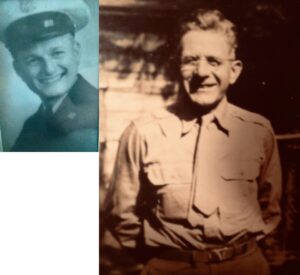
The Meaning of D-Day
Robin and I share a family bond. Both our fathers were wounded WWII veterans.
Her father was on the water, taken to a British hospital unconscious after his ship was bombed in the North Atlantic. My father was in the air, known then as the Army Air Corps, later called the US Air Force. His plane in the South Pacific was hit by artillery fire, causing shrapnel wounds to his leg, which almost led to amputation.
Both survived and returned home to have normal family lives, yet neither talked about their war experiences during their time with us.
We celebrated holidays like Memorial and Veterans Day, but the most important day was June 6th, D-Day. Our fathers honored those who participated and inspired them to keep up their fight.
On the recent 80th D-Day anniversary at the beach in Normandy, those who fought were there again, many in wheelchairs in their nineties, and now some over 100 to honor those who did not make it home.
On those beaches, over 2500 Americans died on June 6, 1944, giving the Allies a foothold back on the European continent to corral the spreading warpath against democracy. At that time, this invasion inspired others, including our fathers in the North Atlantic and the South Pacific.
The reality is sometimes you have to fight. My father was a pacifist, yet because he was raised on a farm and could fly a crop duster, even in his early 40s, he volunteered to serve his country because of the skills he brought to the Air Corps. He exemplified courage, and was our hero.
On June 6, 1944, this nation and many other allied countries fought against despotic leaders and world domination. It was the duty of our fathers to pick up arms and fight back, and they did not sway from this moral obligation.
Democracy is fragile. What would this country be like if our fathers and thousands of others had not had the character and fortitude to protect our nation?
World leaders at Normandy recently praised those present and those who sacrificed their lives. I know our fathers would have been aghast at the ugly rhetoric of anyone who would say those who died were “losers” and “suckers!”
As a geriatric doctor, I cringe to think there might be nursing home residents, men and women, who contributed to defending this country during WWII and are now forgotten.
American leadership must respect and honor those who have served. How we care for our veterans reflects who we are as a nation.
I know our fathers would want to be remembered with the reverence they, as veterans, deserve.
Gene Dorio, M.D.
Originally published in The Signal, our local newspaper, on June 23, 2024
All persons from all war service periods, who gave service in a combat theater should be recognized for their Service contribution to the Nation. Only 2% of the U.S. population serve in the active US military.
Writing about service, talking about those who served, working in a VA hospital – where you were paid for working, is all good. But where is your National service.
Truth is: a bullet fired in WWI, like a bullet fired in WWII, like a bullet fired in Vietnam, Afghanistan and current battle zones, wounds or kills, leaving life long memories, and untold pain.
So as you speak of the greatest, think of the parent who received the knock of notification on their door with the lost of a loved one after D Day.
All service is service to those who served.
Raymond Hall, Veteran US Marine Corps
Thank you so much for writing this article.
I hope that Robin is doing well. My best to both of you..